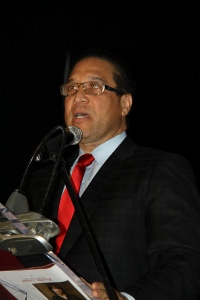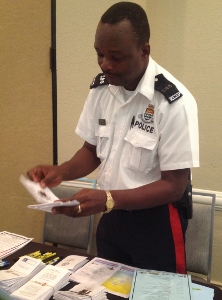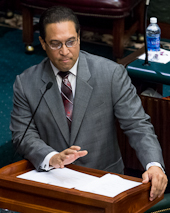Archive for October 7th, 2013

Alden sets out busy year
 (CNS): The premier outlined a busy agenda for his government during 2013/14 when he spoke for more than an hour and a half Monday, as he delivered a policy statement following the governor’s throne speech and ahead of the finance minister’s budget address. As the Legislative Assembly budget meeting opened, Alden McLaughlin listed a catalogue of policy development and legislative amendments the PPM administration hopes to tackle before this financial year is over. Promising sound financial management and responsive social policies, he said there were no silver bullets for the challenges the country faced but confidence in Cayman was being restored after its reputation had been sullied at home and abroad.
(CNS): The premier outlined a busy agenda for his government during 2013/14 when he spoke for more than an hour and a half Monday, as he delivered a policy statement following the governor’s throne speech and ahead of the finance minister’s budget address. As the Legislative Assembly budget meeting opened, Alden McLaughlin listed a catalogue of policy development and legislative amendments the PPM administration hopes to tackle before this financial year is over. Promising sound financial management and responsive social policies, he said there were no silver bullets for the challenges the country faced but confidence in Cayman was being restored after its reputation had been sullied at home and abroad.
In a policy statement entitled 'Getting Back on Course', the premier began by saying that the voters had given the People’s Progressive Movement a mandate to restore the lustre of Cayman’s tarnished reputation.
“A reputation that had been sullied both at home and abroad by charges of corruption, abuse of office, mismanagement of the economy, a soured relationship with the United Kingdom and all manner of unsavoury practices and unseemly behaviour,” he said.
With a good reputation being the flip side of the confidence coin, restoring that confidence was the first step for the new government, which he said had made “considerable headway”, with the “suspicion and scepticism of the Foreign and Commonwealth Office replaced with trust and respect.”
McLaughlin said foreign investors now had “certainty that transparent, legal processes will protect their investments", while local business owners had been "buoyed by the consultative process” that his government is engaging in.
“We know that the restoration of confidence is not a one shot deal and we shall continue to consult regularly with stakeholders in business and civil society and maintain our promise to be open, transparent and accountable,” he said. McLaughlin noted that there were “no silver bullets or 'one size fits all' cures,” before detailing the goals of the government’s first year in office. He said achieving the goals would involve a targeted approach through specific educational and training programmes.
“Investment in a modern infrastructure will be within our means and will yield maximum returns for the country. Expenditure on government and by government will give value for money,” he said, and although government would facilitate the environment, growth and employment would be driven by the private sector. McLaughlin stated that the planned immigration reforms would be the core of future economic expansion that would protect Caymanians while acknowledging the need for a reliable labour force.
With unemployment among locals a key issue, the premier said the revamp of the National Workforce Development Agency (NWDA) would make it easier for Caymanians looking for work as businesses will work directly with the NWDA to find Caymanians to fill their vacancies before they make an application for a work permit.
“We have heard the cries of our people in their search for jobs and we are doing much to ensure jobs for Caymanians in the near and far future,” he said, adding that the combination of increased economic activity, immigration reform, new NWDA initiatives and vocational training will put Caymanians back to work, as he emphasised how it will now be an offence for employers not to acknowledge Caymanian applicants.
McLaughlin also mentioned a suite of programmes to get Caymanians into work from the employment ministry and the identification of over 200 unemployed Caymanians who want to work in hospitality industry that government will be helping to place in jobs beginning this month.
Crime was another area of concern, in particular the recent increase in gun-related crime. McLaughlin spoke about recent police successes, with the round-up of robbery suspects and seizing drug canoes. He said Cayman had to be open for business but closed to criminals as he announced more would be done to try and help vulnerable business to protect themselves, either through legislation or duty concessions. Critical attention was being given to the Crime Reduction Strategy, he said but noted that there are numerous programmes aimed at fighting crime. However, to really make a dent in crime a coordinated effort was required to ensure accountability and effectiveness of these programmes.
In a long speech the premier listed a considerable amount of planned legislation, from the enactment of disability legislation to the national conservation law, which he said would be brought to the LA before the year is out. He revealed that the government intended to adopt the draft climate policy, produced in 2011 by a multi-disciplinary public and private sector initiative led by the Department of Environment, and to begin urgent work on an implementation plan.
McLaughlin announced changes to social policies at the Department of Child and Family Services which would see clinical issues separated from welfare issues, and amendments to the Poor Person’s Relief Law, as well as the development of accompanying Regulations.
They were reviewing and re-writing the Cabinet code of practice to manage government and bring it in line with the constitution, but in the meantime the current guidelines, established in 1995, would be made public for the first time. Government has already published the proposed Standards in Public Life bill, after four years in waiting, on the government gazette.
McLaughlin revealed some planned enhancements on the Sister Islands, including what is likely to prove a controversial plan to develop a runway on Little Cayman. The airport on Cayman Brac will also be enhanced and Cayman Airways will be opening an office on the island. He announced that the costly hurricane shelter on the Bluff, which was nicknamed Hurricane Hilton, will be converted into a new high school.
With a heavy emphasis on reducing government spending to balance the books, McLaughlin also pointed to the importance of e-government, which was an election campaign promise. He said government would utilize technology to cut costs and red tape. He pointed to the high saturation of computer at 74%, internet use at 65% and cell phone owners at 98.5%, with many now using smart phones. Government has plans to maximise information technology to provide better services.
From the boosting of local food production and sports tourism development to exploring how Cayman can become a centre for medical research and the challenges of tackling the George Town dump, the premier listed a myriad of diversepolicy aims and new legislation that his government is hoping to tackle.
McLaughlin said that the budget, which was presented by finance Minister Marco Archer, underpinned the broad plans and would provide the “oxygen to stoke the economic fires” as he thanked everyone involved.
Pointing to the importance of inclusivity in his government, McLaughlin thanked the Speaker, Juliana O’Connor Connolly, for crossing the floor and joining the PPM in the wake of the election, as well the three Coalition for Cayman members and his own Progressives team for providing Cayman with what he was said was the best government possible.
“The result is an administration of immense depth and ability and which I am most honoured to lead,” the premier added.
See the premier’s policy statement below.

PPM predicts $100M surplus
 (CNS): The new Progressive government has presented a budget for 2013/14 with a whopping surplus of some $100.3 million dollars due to cuts in operating expenses and a prediction of decent earnings for government as a result of the sustained revenue from financial services and tourism. Finance Minister Marco Archer said the government expected to bring in over $644 million but will be spending less than $518 million in operating expenses. With debt financing expected to be $31.4 million, core government is hoping for a surplus of more than $95 million, which will be further boosted by some $5million from the statutory authorities and core government companies, following innovative cost cutting measures.
(CNS): The new Progressive government has presented a budget for 2013/14 with a whopping surplus of some $100.3 million dollars due to cuts in operating expenses and a prediction of decent earnings for government as a result of the sustained revenue from financial services and tourism. Finance Minister Marco Archer said the government expected to bring in over $644 million but will be spending less than $518 million in operating expenses. With debt financing expected to be $31.4 million, core government is hoping for a surplus of more than $95 million, which will be further boosted by some $5million from the statutory authorities and core government companies, following innovative cost cutting measures.
Delivering his first full budget, Archer, the new finance minister, made it clear that fiscal prudence, which was the theme of this budget, would be the future modus operandi for his ministry.
Outlining some of the details, Archer demonstrated how he had managed to cut costs already through innovation and thoughtful management of government spending. He pointed to some cost cutting measure among statutory authorities, from foreign exchange reductions, rent removal between government departments and the removal of duty for government agencies, which have led to some $10 million in savings
Archer also noted that government would be improving its revenue collection to ensure it brought in more of the fees it is owed and that going forward it would be better managing concessions and waivers.
Check back to CNS later today for a full report on the budget, throne speech and the policy statement from the premier.

Two primary schools share spoils of season opener
 (CUC-PFL): The Sir John A Cumber Primary and St. Ignatius Prep Under 9s and Under 11s opened the 2013/2014 CUC Primary Football League (PFL) with a win a piece. In the Under 9 game, two goals in the space of 10 minutes during the second half put St. Ignatius Prep on the road to victory. Matthew Lloyd-Hickey blasted his team’s first goal in the 30th minute and Chad Owens scored from a corner in the 39thminute to seal the three points. Sir John A Cumber’s Rashad Powery pulled one back for the boys from West Bay in the 45th minute but St. Ignatius held on for the win.
(CUC-PFL): The Sir John A Cumber Primary and St. Ignatius Prep Under 9s and Under 11s opened the 2013/2014 CUC Primary Football League (PFL) with a win a piece. In the Under 9 game, two goals in the space of 10 minutes during the second half put St. Ignatius Prep on the road to victory. Matthew Lloyd-Hickey blasted his team’s first goal in the 30th minute and Chad Owens scored from a corner in the 39thminute to seal the three points. Sir John A Cumber’s Rashad Powery pulled one back for the boys from West Bay in the 45th minute but St. Ignatius held on for the win.
In the Under 11 game, Sir John A. Cumber’s Jarion Bodden opened the scoring in the 11th minute with a powerful drive from just inside the St. Ignatius half. Daniel Wallace added a second in the 49th minute for the West Bay school before St. Ignatius’ Brad Lansdell pounced on a loose ball in front of the goal in the 55th minute to bring his team back into the game.
Jarion Bodden came close to increasing his team’s lead on a number of occasions only to find the post in his way. Likewise, St. Ignatius’ Cory Smith had a number of shots at goal but unfortunately couldn’t get any on target with the post also being his greatest enemy. Other results from Group A included Truth For Youth 1 vs. George Town Primary 2 (Under 9) and Truth For Youth 0 vs. George Town Primary 3 (Under 11).
In Group B it was Red Bay Primary 1 vs. Prospect Primary 1 (Under 9); Red Bay Primary 0 vs. Prospect Primary 0 (Under 11); Bodden Town Primary 0 vs. South Sound Schools 4 (Under 9); Bodden Town Primary 1 vs. South Sound Schools 5 (Under 11); Triple C 1 vs. Cayman Prep 11 (Under 9) and Triple C 0 vs. Cayman Prep 4 (Under 11).
The 2013/2014 CUC PFL regular season continues this Saturday, October 12 with games at Savannah Primary, Cayman Prep, Prospect Primary, Triple C and the Annex.

Judge follows robbers’ route in WestStar trial
(CNS): Visiting Grand Court judge Justice Alastair Malcolm, QC, who is presiding over the trial of four men accused of robbing the local TV cable company in May last year, left the confines of the courtroom last week to examine the route taken by the robbers, as recorded on the government’s CCTV footage. The judge was invited to see how the suspects got to the crime scene so he would be in a better position to assess the evidence from a witness, who the defendants' attorneys say has lied about the involvement of their clients. The four defendants also travelled with the judge, defence and crown attorneys and other support staff Friday ahead of the main witness taking the stand.
The case has been stalled over the last few months because of significant legal arguments relating to witness Marlon Dillon, who says he was told about the robbery and had offered to drop the four accused men, Andre Burton, David Tamassa, George Mignot and Ryan Edwards, at the location. However, the case is expected to resume today with Dillon on the stand.
During last week’s proceedings a confession by defendant Ryan Edwards was also a source of contention among the lawyers representing his co-defendants as his testimony heavily undermines the key witness’s claims. Deputy Director of Public Prosecutions Trevor Ward, QC, who is prosecuting the case, told the court that Dillon's initial account was to be the crown's case until May this year but he accepted that there were many discrepancies between his account and that of Edwards. Nevertheless, the crown still submits that his identification of who the robbers were is still accurate.
So far, the crown has presented a number of other witnesses, including Jay Ebanks, who was employed at WestStar at the time of the heist and who was arrested and interviewed during the investigation. During his time on the stand Ebanks admitted to knowing a fifth defendant, who is also charged in connection with the robbery but scheduled to be tried separately at a later date.
Ebanks denied receiving a $2,000 cut of the proceeds for his help in committing the theft – a crime he was never charged with. Ebanks, who is still employed by WestStar, insisted that he had nothing to do with the planning or execution of the robbery.

Cayman teen signs up with UK football club
 (CIFA): Five months before the first ball was kicked at the inaugural CONCACAF Under 15 Football Championships in the summer, football history in the youth ranks was made yet again in the Cayman Islands when in April 2013, 14-year-old Caymanian Nathan Borde signed a one-year development contract with Swindon Town Football Club’s Youth Academy. Nathan joins fellow Caymanians, Sebastian Martinez and Kray Foster, at Swindon Town’s prestigious Youth Academy following a short spell with Sheffield Wednesday’s Youth Academy. A fourth Caymanian youngster, Cameron Gray, plies his trade at the Youth Academy at Reading FC. All four play for Cayman's under-17 national team.
(CIFA): Five months before the first ball was kicked at the inaugural CONCACAF Under 15 Football Championships in the summer, football history in the youth ranks was made yet again in the Cayman Islands when in April 2013, 14-year-old Caymanian Nathan Borde signed a one-year development contract with Swindon Town Football Club’s Youth Academy. Nathan joins fellow Caymanians, Sebastian Martinez and Kray Foster, at Swindon Town’s prestigious Youth Academy following a short spell with Sheffield Wednesday’s Youth Academy. A fourth Caymanian youngster, Cameron Gray, plies his trade at the Youth Academy at Reading FC. All four play for Cayman's under-17 national team.
Young Borde’s journey to Swindon Town FC has been very different from Sebastian’s and Kray’s, and Cameron’s at Reading. The three Youth Academy ‘veterans’ have had the advantage of having an adult support network very close to them on which to rely, whereas Nathan was at a boarding school in Sheffield, a far cry from the warmth of his home, family and friends in Grand Cayman.
This alone is a true testament of young Nathan’s mental strength and desire to achieve his goal of eventually playing at the professional level. Nathan’s only adult support while in Sheffield was that of Fitzroy Simpson, who was nearly four hours away in Swindon (London) and whohas been the pivotal figure in the four youngsters’ enrollment at the respective academies. The Technical Director at Goald Football Management in the United Kingdom, Mr. Simpson is no stranger to the Caribbean and the Cayman Islands having played professionally for Portsmouth FC, Manchester City and Swindon Town FC as well as representing Jamaica at the 1998 World Cup Finals in France.
Although Nathan was doing very well at school, Mr. Simpson, who had assisted with Nathan’s initial enrollment at Sheffield Wednesday’s Youth Academy, had been following the youngster’s football progress and ultimately was not satisfied.
Gaining permission from Nathan’s parents, Nicholas and Josette Borde, Mr. Simpson arranged a three-week trial with Swindon Town FCs Youth Academy for the youngster in March 2013. Pleased with what he saw,
Jeremy Newton, Swindon’s Youth Academy Manager, invited Nathan to tour Holland with Swindon’s Under 13 squad. Following the trial period and the tour of Holland, Nathan returned to school in Sheffield and Sheffield Wednesday’s Youth Academy.
Three weeks later, Mr. Newton offered Nathan a one-year development contract with Swindon Town’s Youth Academy and after gaining acceptance into the school Sebastian Martinez attends and arranging suitable housing arrangements in Swindon, young Mr. Borde became the newest recruit at Swindon Town’s Youth Academy.
Commenting on his son’s achievements, a beaming Nicholas Borde said, “We are obviously very, very proud of Nathan. My wife and I cannot thank Mr. Simpson enough for all he has done for Nathan (and us). To list the many areas of assistance, guidance and general help Fitzroy has offered would be just too long. His achievements, knowledge, experience and reputation in the football industry is well respected at the highest levels and Mr. Simpson has been an inspiration for Nathan. He demands the very best from Nathan and pushes him in every aspect to become a better footballer and a well-rounded, disciplined young man.”
Realising that he has a long way to go and much to learn, Nathan has already settled well at school and at his new club. On Sunday, September 29, he scored a goal and assisted with another as Swindon’s Under 14s defeated rivals Oxford United 3-2.
“Nathan is slight in stature but massive in desire,” added Mr. Simpson. “He is now a part of Swindon Town’s prestigious Youth Academy on merit. I cannot think of another 14-year old who would leave the ‘safety net’ of his family to be alone in a strange country. Nathan’s journey is now real and he fully understands that with the proper work ethic his targets can be achieved, which is the same for all the youngsters at Swindon Town FC.”
Borde added, “We thank the many coaches who have made a positive impact in Nathan’s development including Winston Chung, John Megson (at Sheffield Wednesday), Virgil Seymour, Bruce Sigsworth and Paolo Polloni.”
A new journey has begun for Nathan and one that the Cayman Islands will be following very closely.
PR to get much tougher
(CNS): As all expat workers will now be allowed to stay in Cayman long enough to make a permanent residency applications, the government is about to make it much tougher for them to be approved. Applicants will require more points to qualify, and despite the premier talking about the need for a wider cross-section of people to get PR, it will now be even more difficult for the not so well off to stay. A review committee has recommended that the points system be revamped to focus more closely on the economic, social and cultural needs of the Cayman Islands, and although it will give a clearer indication to those applying what their chances are, cash investment, income and earning potential will be essential to the outcome.
Officials said that the revised point system will allow government to select permanent residents who have the skills and experience in occupations that are needed in the Cayman Islands in the short and long terms but the premier said it would now be tougher to get through. “It is certainly going to be more difficult to get permanent residency under the new regime,” said Premier Alden McLaughlin.
The proposed new system will use data from the annual Labour Force Survey, the National Census and work permit statistics to determine the ratio of Caymanians to non-Caymanians in the workforce.
If government settles on the recommendations, points will be awarded based on the occupation in which the applicant is working and additional points will be available if their job is designated as one that is needed for the advancement of the national, economic, cultural or social objectives on a long-term basis. As the country evolves, government should adjust the desired occupations and that a list of priority occupations is gazetted to ensure transparency.
The “skills” category in the current system will be dropped and replaced by “education, training and experience”. Points would be given based on the level of academic or technical training received, the length of education or training and its degree of difficulty. The committee suggests that the higher the level of education, the increased likelihood that the applicant would be able to continually obtain gainful employment and maintain himself and his dependents, according to a release from government explaining the proposed changes.
Despite the occupation and educational standard of an applicant, unless they are financially well off, the goal of achieving PR will be very tough for those who have not injected a significant amount of cash into a property or a business.
Total investment made by the applicant, debt ratio and average monthly income will be significant and no points will be awarded to applicants without a total investments of less than CI$50,000 for the last five years. Maximum points would be awarded to applicants that have invested more than $500,000 over the past five years. The committee also recommends that points should be awarded based on the actual amount of personal funds invested rather than on the basis of funds subject to a mortgage.
This means wage earners who have managed to buy themselves a home could still get zero points if their deposit was less than $50,000. In addition, applicants will not get points for pension contributions but will need to demonstrate other means of being able to support themselves.
The new system also takes aim at what the government said was one of the most abused categories under the current points system of community contribution. Government officials said applicants join service clubs shortly before making the application for PR in order to boost points but the revised system clarifies priority areas and sets minimum levels of service to the community. Applicants who demonstrate active involvement in the training and employment of Caymanians and the rehabilitation and mentoring of offenders would get higher points.
The PR history and culture test remains, but questions will now be randomly selected from a bank of 300-400 questions to reduce the likelihood of questions being copied and circulated. Under the new points system, the requirement for references has been removed.
Also being removed are points for being married to a Caymanian because those who are already receive considerable benefits under immigration legislation. They will still be eligible to apply for PR but will be assessed on the same level as all applicants. PR applicants who have Caymanian grandchildren will not be awarded special points.
A new additional category is age, which does not bode well for those under 24 and those over 60. The committee recommended controlling age diversity to balance the labour market so that the long-term sustainability of worker supply to the islands is assured.
The new system will also seek to balance nationalities and although the new system does not identify any particular one, it will directly impact Jamaicans as they remain the largest foreign national group holding work permits. Under the current points system, the awarding of points in this category is discretionary but the committee said this should be changed, giving top points to foreign nationals from countries that have less than 5% of their nationals holding work-permits.
Points can be deducted in the new system for health reasons as well as for bad character or breaking any laws. With appeals being made tougher and an increase in the application fee, government is hoping that a more stringent PR points system will reduce the number of applications and allow only a few people to eventually go on each year to become Caymanian.

Poor turnout at crime event
 (CNS): Despite the recent escalation in violent crime over the last few months, with a surge of gun crimes including robberies, home invasions, door step hold-ups and two murders inside one month, there was a low turnout at a crime prevention seminar hosted by the RCIPS Thursday. Given the comments made by the keynote speaker, Jamaican crime fighter William Shagoury, chair of the Clarendon Crime Prevention Committee, the poor turnout does not bode well in the fight against rising crime levels. According to Shagoury, it is not until all members of a community have had enough and come together to take collective crime prevention action, in coordination with the police and relevant authorities, that crime can be reduced.
(CNS): Despite the recent escalation in violent crime over the last few months, with a surge of gun crimes including robberies, home invasions, door step hold-ups and two murders inside one month, there was a low turnout at a crime prevention seminar hosted by the RCIPS Thursday. Given the comments made by the keynote speaker, Jamaican crime fighter William Shagoury, chair of the Clarendon Crime Prevention Committee, the poor turnout does not bode well in the fight against rising crime levels. According to Shagoury, it is not until all members of a community have had enough and come together to take collective crime prevention action, in coordination with the police and relevant authorities, that crime can be reduced.
Most of the small audience consisted of staff at government agencies or board members of the seminar's partner agencies, the Cayman Islands Tourism Association and the Chamber of Commerce. The man in the street and small business owners were conspicuous by their absence.
Chief Superintendent Kurt Walton expressed his disappointment at seeing so many empty chairs at the seminar, as he too noted that the police are but one spoke in the wheel when it comes to fighting crime and policing by consent. Most of the speakers agreed that crime will only be stamped out when everyone makes it their business to do what they can to prevent crime, report what they see and become involved in what Chamber of Commerce President Chris Duggan described as the “general welfare of society”.
Although Cayman has been facing a gradual increase in violent crime as a result of many external factors, such as the ongoing international war on drugs and economic hardship, the government spends around 20% of its entire budget on fighting crime and the criminal justice system in general. Eric Bush, the chief officer in the new Home Affairs Ministry, explained that this government arm, which encompasses all of the departments relating to security, is the biggest spender across core government.
The RCIPS is one of the few agencies in government that is not facing the level of cuts experienced across government. Armed with a national CCTV system, a helicopter, a specialist marine unit and around 400 officers, the government is maxed out on financing the crime fight.
However, key note speaker Shagoury pointed out that the amount of money spent on fighting crime is not the sole solution. Coming from Jamaica, where budget restrictions are even greater and the crime far worse, he said they would love to have the kind of budget Cayman has for crime fighting. In the end, turning around the crime levels in Clarendon was about that community reaching the end of its rope when it came to tolerating crime.
Shagoury said that with buy-in from the community and a multi-agency approach, the crime reduction committee in Clarendon was able to reduce the murder rate from three or four murders a week at one point to less than half a dozen a year.
He pointedout that poverty is and continues to be a major cause of crime, so injecting money into the community to help develop small and medium enterprises and infrastructure improvements was the first step in the crime reduction strategy. Alongside poverty, he pointed to ignorance, poor levels of education and a lack of access to knowledge and information as another major cause.
The crime fighter also said that dishonesty and corruption among the authorities and politicians, with the development of cultures of dependency, fuels crime, as well as the problems of drug dons filling the vacuum left by the authorities in deprived neighbourhoods. He spoke about the problems relating to children having children and the fact that Jamaican men were falling by the wayside.
Despite the major problems of significant poverty and ignorance, the neglect of the communities, the tolerance of crime and massive distrust of the police, once the community decided it had had enough, the real fight against crime began.
The key, he said, was for the communities to fight crime at the grass roots levels and for the people to decide how to re-build their communities and address the issues of poverty, poor education, corruption, the culture of dependency and drug gangs together. He warned that imposing projects or crime prevention initiatives on the community doesn’t work and that it has to come from the people.

LA opens for budget session
 (CNS): The country’s parliament will open at 10am Monday morning for the government to present its full 2013/14 budget. Despite being more than three months into this financial year, the change of government following the general election led to the need for an interim emergency budget, based on the previous year’s, to enable the new PPM government to collect and spend public money until it shaped its own spending plan. The government has promised that there are no new revenue raising measures, with the exception of the already earmarked directors’ fees, which were set for the last budget but were never introduced.
(CNS): The country’s parliament will open at 10am Monday morning for the government to present its full 2013/14 budget. Despite being more than three months into this financial year, the change of government following the general election led to the need for an interim emergency budget, based on the previous year’s, to enable the new PPM government to collect and spend public money until it shaped its own spending plan. The government has promised that there are no new revenue raising measures, with the exception of the already earmarked directors’ fees, which were set for the last budget but were never introduced.
The budget, which received the nod from the UK last week, is expected to reveal a significant reduction in spending.
The session will begin, as is traditional, with the governor’s throne speech, which will be presented on the floor of the Legislative Assembly. This will be Helen Kilpatrick’s first major public presentation following her short acceptance speech when she arrived last month. As a fiscal expert herself, Kilpatrick is expected to play a significant part in managing public finances. Premier Alden McLaughlin is expected to deliver a presentation outlining the thinking behind the budget, followed by the delivery of the details by Marco Archer, the finance minister.
Speaking at the recent Chamber of Commerce Legislative Lunch last month, the premier said that the PPM’s four-year fiscal plan had received the approval of the UK on first submission and this will be the first budget under the revised long term plan. Without what McLaughlin called “a lot of fiscal space in which to operate”, he said the budget was “a test of fiscal discipline characterized by new levels of efficiency and imaginative solutions” to achieving the necessary budget goals.
Over the years the Cayman government’s spending has reached almost three quarters of a billion dollars, pushing revenue generation to the maximum. But with a new era of fiscal discipline in the civil service, which McLaughlin said had been embraced by public sector management, and with the assistance of Richard Holmwood, the FCO’s economic advisor, the budget would see even further reductions in spending and in particular personnel costs.
With no new borrowing and plans to continue paying down the existing debt and make a substantial contribution to government’s past service pension liability, any “investments in capital projects will be responsible and revenue measures will be zero inflationary,” he said, adding that the budget projects a substantial surplus.
Including statutory authorities, the government holds more than $700 million of debt, which still breaks the country’s own fiscal standards set out in the Public Management and Finance Law, which states that government’s loan package cannot be more than 80% of its annual core government revenue earnings. As a result, the UK government is keeping a close supervisory eye on Cayman’s public finances. It has banned all borrowing and is looking for realistic achievable budget plans.
The ban on borrowing imposed by the UK will remain in place until government has reduced its debt and builds up its cash reserves, despite the private sector’s demands on government for more infrastructure development, such as the airport redevelopment and the cruise berthing facilities.
The battle to pull this budget together has not been easy and McLaughlin has spoken about the need for government to think about designing budgets for a full 4-year government term, as the process dominates the legislative calendar. As soon as one annual spending plan is presented to the LA and passed, the cycle starts all over with the delivery of the government’s Strategic Policy Statement in December, which should guide the delivery of a budget in the following April. This needs to be approved and steered through the LA and Finance Committee before the end of June.